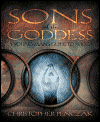
With Sons of the Goddess, Christopher Penczak takes his first shot at filling the market void of Wiccan materials tailored for young men – making a total of three books specifically directed at this group. At first glance you have ‘the usual’ material: Sabbat rituals and generic ethical, historical and practical basics. But then Penczak goes beyond the basics and provides real practice. There are magical contents and ideas I have previously never heard of nor seen used. He even provides myth-stories about the deities discussed, rather than resorting to long lists of God names for practitioners to simply insert into ritual. I am impressed enough that I would recommend this beginner’s book to young women.
Penczak is young, darn handsome, and he gives younger men someone responsible and intelligent with whom they can identify. I feel this is particularly valuable for young men who have sexuality and gender identities in transition, complicated by their explorations into ways to align the spiritual self with a physical self. Wicca traditionally placed restrictive and specific values on gender and changing gender roles, and Penczak talks about his own experience frankly without coming off like a guru.
Penczak points newcomers back to the origins of Wicca, which were rich with positive and not-so-positive male role models who all contributed significantly to the religion’s evolution as a faith. I’ll make this quibble: much of this information celebrating men’s history in Wicca is relegated to sidebars. (Not unusual, given the Feminist roots of modern witchcraft in America.) My favorite of these cited Gerald Gardner and Alex Sanders as founders of Wicca, and then listed the men involved in the evolution of the religion in the 20th century. Whether or not either they can be classed as a founder depends on how a given historian sees it (and depending on the cultural perspective); he also incorrectly alludes to 1734 as Wiccan. He tries to hard to make everyone happy at the cost of some historical accuracy, but gets his point across clearly: men contributed to Wicca’s existence, too.
The subject of men in Wicca, and about gender relations in Wicca as a whole is poorly discussed. Understandable as it is (given Wicca’s foundation and history) it leaves a gaping whole in the balance. For young men in particular, this gap can leave them feeling like Wicca is not for them, or at least not for them unless they are able to emulate the Horned One with his female-oriented virility – no place for gender-issues or male-male love here! The reasons men come to Goddess religions are less discussed and perhaps not as well understood by men themselves, particularly men/women that are crossing and changing traditional gender divides. As more Wiccan women have children, some of whom are Wiccan-raised sons, and as more young men begin coming into the faith by their own means, there will be ever more questions, and ever increasing need for straightforward discussion. Penczak is one of the first to answer to these needs, and the best.
~review by Lisa Mc Sherry
by Christopher Penczak
Llewellyn Publications, 2005
